Rnsg 1443 cancer Study guides, Class notes & Summaries
Looking for the best study guides, study notes and summaries about Rnsg 1443 cancer? On this page you'll find 9 study documents about Rnsg 1443 cancer.
All 9 results
Sort by
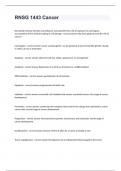
-
RNSG 1443 Cancer questions with answers
- Exam (elaborations) • 3 pages • 2024
- Available in package deal
-
- $9.99
- + learn more
RNSG 1443 CancerDecreased immune function (surveillance), increased life-time risk of exposure to carcinogens, accumulation of free radicals leading to cell damage - correct answer why does aging increase the risk of cancer? Carcinogens - correct answer cancer causing agents; can be genotoxic (cause irreversible genetic change in cells); can act as promoters Dysplasia - correct answer abnormal cell size, shape, appearance, or arrangement Anaplasia - correct answer Regression of a cell t...
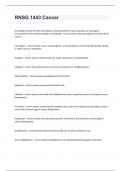
-
RNSG 1443 Cancer questions well answered
- Exam (elaborations) • 3 pages • 2024
- Available in package deal
-
- $9.99
- + learn more
RNSG 1443 CancerDecreased immune function (surveillance), increased life-time risk of exposure to carcinogens, accumulation of free radicals leading to cell damage - correct answer why does aging increase the risk of cancer? Carcinogens - correct answer cancer causing agents; can be genotoxic (cause irreversible genetic change in cells); can act as promoters Dysplasia - correct answer abnormal cell size, shape, appearance, or arrangement Anaplasia - correct answer Regression of a cell t...
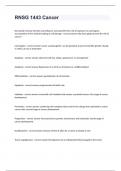
-
RNSG 1443 Cancer Question and answers verified to pass
- Exam (elaborations) • 3 pages • 2024
- Available in package deal
-
- $14.49
- + learn more
RNSG 1443 Cancer Question and answers verified to passRNSG 1443 Cancer Decreased immune function (surveillance), increased life-time risk of exposure to carcinogens, accumulation of free radicals leading to cell damage - correct answer why does aging increase the risk of cancer? Carcinogens - correct answer cancer causing agents; can be genotoxic (cause irreversible genetic change in cells); can act as promoters Dysplasia - correct answer abnormal cell size, shape, appearance, or arra...
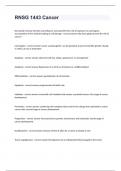
-
RNSG 1443 Cancer questions and answers certified 2024
- Exam (elaborations) • 3 pages • 2024
- Available in package deal
-
- $13.49
- + learn more
RNSG 1443 Cancer questions and answers certified 2024
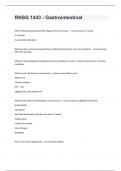
-
RNSG 1443 - Gastrointestinal fully solved
- Exam (elaborations) • 10 pages • 2024
- Available in package deal
-
- $15.49
- + learn more
RNSG 1443 - GastrointestinalWhat is the postoperative priority diagnoses for oral cancer? - correct answer 1. airway 2. nutrition 3. prevention/education What are three common postoperative nutritional therapies for oral cancer patients? - correct answer PEG, TPN, NG tube Where in the esophagus is esophageal cancer most likely to occur? - correct answer Lower 2/3 of the esophagus What are the risk factors of oral cancer? - correct answer Tobacco use Alcohol use Chronic irritation H...
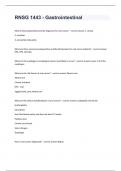
-
RNSG 1443 - Gastrointestinal questions with complete solutions
- Exam (elaborations) • 10 pages • 2024
- Available in package deal
-
- $12.99
- + learn more
RNSG 1443 - GastrointestinalWhat is the postoperative priority diagnoses for oral cancer? - correct answer 1. airway 2. nutrition 3. prevention/education What are three common postoperative nutritional therapies for oral cancer patients? - correct answer PEG, TPN, NG tube Where in the esophagus is esophageal cancer most likely to occur? - correct answer Lower 2/3 of the esophagus What are the risk factors of oral cancer? - correct answer Tobacco use Alcohol use Chronic irritation H...
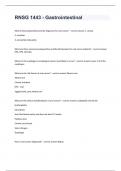
-
RNSG 1443 - Gastrointestinal Question and answers correctly solved
- Exam (elaborations) • 10 pages • 2024
- Available in package deal
-
- $13.99
- + learn more
RNSG 1443 - Gastrointestinal Question and answers correctly solved RNSG 1443 - Gastrointestinal What is the postoperative priority diagnoses for oral cancer? - correct answer 1. airway 2. nutrition 3. prevention/education What are three common postoperative nutritional therapies for oral cancer patients? - correct answer PEG, TPN, NG tube Where in the esophagus is esophageal cancer most likely to occur? - correct answer Lower 2/3 of the esophagus What are the risk factors of oral...
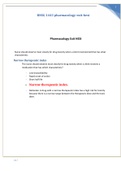
-
RNSG 1443 pharmacology-exit-hesi latest
- Exam (elaborations) • 31 pages • 2023
-
- $12.49
- + learn more
RNSG 1443 pharmacology-exit-hesi Pharmacology Exit HESI Nurse should observe most closely for drug toxicity when a client receivesmed that has what characteristic Narrow therapeutic index The nurse should observe most closely for drug toxicity when a client receives a medication that has which characteristic? • Low bioavailability • Rapid onset of action • Short half life • Narrow therapeutic index. • Rationale: A drug with a narrow therapeutic index has a hig...
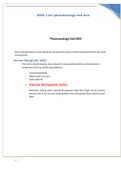
-
RNSG 1443 pharmacology-exit-hesi latest
- Exam (elaborations) • 31 pages • 2023
-
- $12.99
- + learn more
RNSG 1443 pharmacology-exit-hesi Pharmacology Exit HESI Nurse should observe most closely for drug toxicity when a client receivesmed that has what characteristic Narrow therapeutic index The nurse should observe most closely for drug toxicity when a client receives a medication that has which characteristic? • Low bioavailability • Rapid onset of action • Short half life • Narrow therapeutic index. • Rationale: A drug with a narrow therapeutic index has a hig...

How much did you already spend on Stuvia? Imagine there are plenty more of you out there paying for study notes, but this time YOU are the seller. Ka-ching! Discover all about earning on Stuvia


